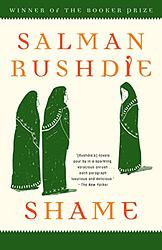Shame by Salman Rushdie
"Shame" is a novel that explores the political and social climate of post-colonial Pakistan through the intertwined lives of three families. The story is a blend of magical realism and historical fiction, focusing on themes of shame, identity, and power. The narrative is laced with satire and explores the consequences of living in a society where honor is prized above all else. The story unfolds in a non-linear fashion, giving readers a deep insight into the complex socio-political dynamics of a nation in transition.
The 1788th greatest book of all time
- Published
- 1983
- Nationality
- British
- Type
- Fiction
- Pages
- 319
- Words
- 100,000
- Original Language
- English
If you're interested in seeing the ranking details on this book go here
This book is on the following lists:
- 1001 Books You Must Read Before You Die (The Book)
- 1000 Novels Everyone Must Read (The Guardian)

